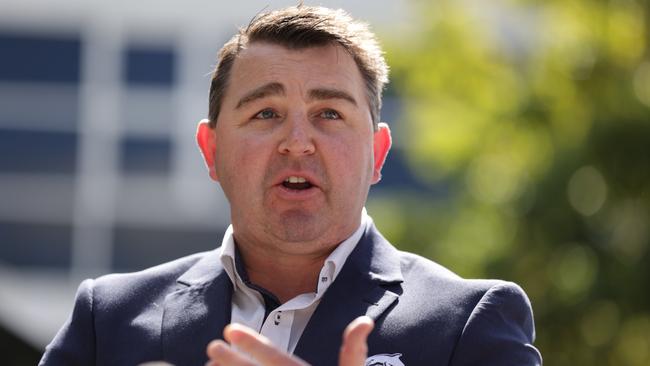The secret report that backs the Dolphins’ bid to be the 17th team
Secret report backs the Dolphins’ bid for the NRL as the expansion race edges towards the finish line.

A high-level report by accountancy firm PriceWaterhouse Coopers has emerged as the secret weapon in the Redcliffe Dolphins’ bid to win the game’s expansion race.
The report, obtained by News Corp, takes a deep dive into the reach of the three bidding parties and their potential impact on the other sides in southeast Queensland. It suggests the Dolphins would attract more fans than the other two bids, without canabilising existing southeast Queensland teams.
It is understood the document forms part of the paperwork that the Dolphins sent to the NRL in their application for the 17th licence, and has subsequently come to light as the Brisbane Firehawks and Jets take a breath after stalled talks over a proposed merger.
The Firehawks and Jets were locked in delicate negotiations late last week as they sought to intensify the pressure on the Dolphins, the clear favourites to win the 17th licence should the ARL Commission press the go-button on expansion.
However, those talks appear to have hit a brick wall, leaving the Jets and Firehawks to go it alone. The Dolphins, meanwhile, have been sitting back and watching events unfold with quiet confidence, in part because of the PwC investigation eases some of the ARL Commission’s major concerns around growing the game’s fan base and cannibalisation of the existing sides.
The Commission made it clear that their decision around the 17th team would be contingent to a large extent on bringing new fans to the game rather than poaching supporters from the Brisbane Broncos and Gold Coast Titans.
The Dolphins insist they are best placed to meet both criteria and have the evidence in the form of a 21-page document that suggests their bid is the most palatable when it comes to the commission’s well-documented concerns.
“With a successful NRL bid, the Dolphins plan to mobilise their existing supporters while additionally taking up the role of a true second team for Brisbane,” the sport states.
The report says that by taking games to Sunshine Coast Stadium and their existing home ground of Moreton Daily Stadium, the Dolphins will give the commission incremental growth beyond that provided by the Jets and Firehawks.
“As both the Dolphins and the Jets propose to play the majority of home games at Suncorp Stadium, each team will have an inevitable impact within this catchment,” the report states.
“However, by additionally playing home games at Moreton Daily Stadium and Sunshine Coast Stadium, the Dolphins provide larger incremental growth to the NRL within those new markets.
“Currently Brisbane is a ‘monopoly market’, serviced by only one NRL team, despite hosting the second-largest concentration of NRL fans in Australia.
“The introduction of a new and second team would allow for an NRL game to be played at Suncorp Stadium on most weekends during the regular season, providing more opportunities to attend NRL games to Brisbane-based fans who may not have the means to travel for away games.
“Additionally, the positive net impact of increasing total support in a given market through the introduction of a new team and generation of ‘local derby’ rivalries is well understood, and evidenced by the entry of the Western Sydney Wanderers into the Sydney A-League market.”
The report makes it clear that the game will benefit from a second team in Brisbane through the derby effect, giving clear evidence of how it has worked in other sports.
“Currently the Broncos play home games at Suncorp Stadium approximately once every two weeks, leaving capacity for another team to play home games on alternate weeks,” the report says.
“Existing NRL fans who support the Brisbane Broncos are likely to continue to support that team. However, by (nearly) doubling the number of NRL regular-season games at Suncorp, there is an opportunity to broaden and increase the NRL’s penetration into the south east Queensland market.
“By adding a second team, the NRL may be able to capture further supporters within the greater Brisbane region, attracting more ‘casual’ fans to games (as games are played more often), and potentially increase club memberships and ongoing patronage at games and other events.
“Any potential market overlaps between the incumbent Titans and either of the incoming competitors, Dolphins or Jets, will be immaterial due to the very small populations within these modelled overlaps.
“Matches where two local teams play each other in their home cities are known as derby matches. It is well documented in Australian professional sports that derby matches result in significant increases in supporter turnout for both teams.”
Meanwhile, the Jets on Wednesday revealed they had negotiated a five-year sponsorship contract, worth $4 million annually.
By their own admission, the Jets are the poorest of the three bids, with the Ipswich consortium lacking the fiscal muscle of the Dolphins’ $100 million asset base and the Firehawks’ $25 million in cash reserves.
But Jets chief Nick Livermore says their $20m commercial deal puts the western-corridor bid firmly in the frame to win the 17th licence.
“With this commercial deal, we will have money from day one,” Livermore said.
“I cannot disclose the identity of the parties due to confidentiality, but we have a signed five-year agreement in place worth $4 million annually for our major sponsorship and other corporate arrangements.”



